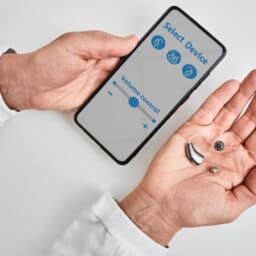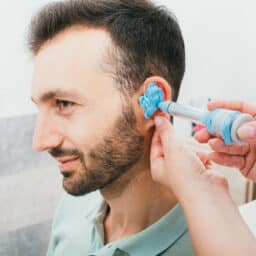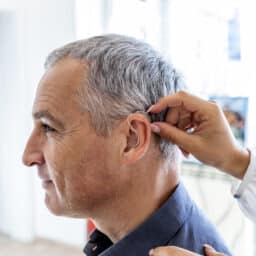Addressing the Stigma Around Hearing Aid Use

Nearly 29 million people could benefit from using hearing aids, yet many people still hesitate to consider them. Much of this reluctance may stem from lingering misconceptions and outdated ideas that prevent people from seeking help. It’s time to address these concerns and reframe how we think about hearing aids. Why People Avoid Hearing Aids…
Integrating Hearing Aids with Modern Devices
Hearing aids today are advanced, tech-savvy devices that amplify hearing and connect users to the world around them. Nearly 28.8 million Americans could benefit from using hearing aids, but many don’t take advantage. Now, hearing aids can integrate with many technological devices people use every day, enhancing their convenience. Hearing Aids and Smartphones One of…
The Importance of Regular Hearing Evaluations

Hearing is one of our most vital senses, connecting us to the world around us. It plays a critical role in communication, safety, and social well-being. Yet, we don’t often give hearing care the same attention we give dental and optical care. Regular hearing checks are an important part of overall wellness, especially as we…
Navigating the Latest Hearing Aid Technologies

While nearly 28.8 million Americans could benefit from hearing aids, a large percentage of those people don’t use them. Hearing aids have come a long way from bulky devices and basic amplification. The latest hearing aid technologies are transforming the hearing aid experience toward more personalization than ever before. Here’s a look at five groundbreaking…
Impact of Hormones on Hearing Loss

Hormones influence many aspects of our health, including hearing. Fluctuations in hormone levels, particularly estrogen and progesterone, can affect the inner ear, potentially leading to hearing disturbances. The Role of Hormones in Hearing Hormones are chemical messengers that regulate critical functions throughout the body. Some studies indicate that estrogen, a hormone primarily associated with the…
How Noise Affects Your Mood and Memory
Exposure to noise not only has the potential to damage hearing but can trigger stress and irritation as well. Understanding how noise influences your overall well-being can help create a healthier, more productive environment. The Connection Between Noise and Mood Unwanted noise can trigger stress and irritation, even when it isn’t overly loud. According to…
Common Misconceptions About Tinnitus
Tinnitus is the perception of ringing, buzzing or other sounds despite no sound being present. Nearly 10% of U.S. adults have experienced tinnitus lasting five minutes or more. Despite its prevalence, there are misconceptions about tinnitus and how it affects people, as well as what can be done to manage it. Here are a few…
Do Hearing Aids Help Tinnitus?
Tinnitus is a condition characterized by hearing sounds that aren’t caused by external sources, such as ringing, buzzing or hissing. Approximately 10% of Americans have experienced tinnitus lasting five minutes or more in the past year. Understanding how tinnitus relates to hearing loss and the role hearing aids can play in managing its symptoms can…
Are Custom Earplugs Right for You?

Whether you took a woodshop class in high school, worked in construction or attended many concerts at the Hollywood Bowl, you’re probably familiar with hearing protection options like earmuffs or earplugs. While earmuffs and earplugs offer good hearing protection, people frequently exposed to high-volume noise may want to consider custom earplugs to ensure their hearing…
Tips to Create a Daily Hearing Aid Routine

Embarking on the journey of wearing hearing aids can be both exciting and challenging. While these devices open a world of sound and connection, they also require some adjustment and care to ensure they function optimally. Among adults aged 70 and older who need hearing aids, only 30% have ever used them. Establishing a routine…